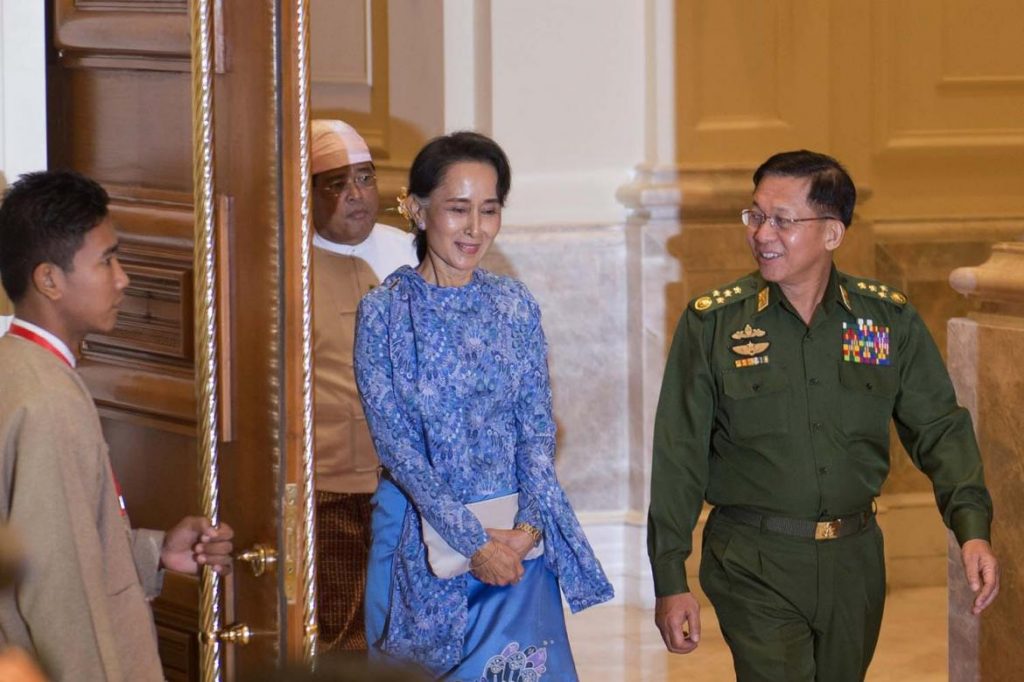The NLD government is caught between the Tatmadaw and the international community over a solution to the Rakhine crisis and pleasing both sides will be difficult.
By SITHU AUNG MYINT | FRONTIER
AN ATTEMPT to block a government decision for a foreigner to be included on another commission on Rakhine State was tabled, debated and defeated in the Pyithu Hluttaw on June 11. The National League for Democracy used its numbers in the 440-seat chamber to defeat the motion by 251 votes to 138, with three abstentions.
The motion was in response to an announcement by the President’s Office on May 31 that the government planned to appoint a three-member commission to investigate allegations of human rights abuses in Rakhine after the attacks by fighters from the Arakan Rohingya Salvation Army last August. The inclusion of a foreigner was condemned during the debate by Tatmadaw lawmakers and MPs from the Union Solidarity and Development Party and Arakan National Party.
Comments made by Tatmadaw and opposition MPs during the debate show that the decision to include a foreigner on the panel has created a difficult situation for State Counsellor Daw Aung San Suu Kyi and the NLD government.
USDP MP and retired Lieutenant-Colonel U Thaung Aye (Pyawbwe) said appointing an independent commission that included a foreigner was in breach of the constitution, which the Tatmadaw has vowed to defend. He raised concern that the situation could lead to a confrontation between the NLD government and the Tatmadaw.
Support more independent journalism like this. Sign up to be a Frontier member.
Tatmadaw MPs said a commission that included a foreign disparaged the nation’s sovereignty and showed disrespect to the Myanmar people.
U Oo Hla Saw (ANP, Mrauk-U) said the government and the Tatmadaw had already investigated allegations of human rights abuses in Rakhine and if another investigation was necessary it should only involve Myanmar citizens.
The defeat of the motion does not mean that the NLD government has overcome the controversy over the panel’s composition. It can be argued that the roots of the controversy lie with the United Nations Security Council call to the government on May 9 to conduct a transparent investigation into abuses in Rakhine and to allow UN agencies to enter the state to provide humanitarian aid.
The Security Council, which visited Myanmar and Bangladesh in late April and early May, also called on the government to implement the recommendations of the advisory commission on Rakhine headed by former UN secretary-general, Mr Kofi Annan.
The Security Council also gave the government 30 days to report back on what had been achieved On June 6, the government signed a memorandum of understanding with the UN refugee agency, the UNHCR, and the UN Development Programme, on the return of refugees.
The tripartite MoU was “a first and necessary step to establish the framework between the UN and the government aimed at creating conducive conditions for the voluntary, safe, dignified and sustainable repatriation of refugees from Bangladesh,” the UNHCR said in a statement.
However, the Tatmadaw, USDP and ANP do not want UN agencies to return to northern Rakhine. The government’s decision to sign the MoU followed pressure from the Security Council and moves to bring Myanmar before the International Criminal Court over allegations of widespread abuses during the military operation in Rakhine.
Several commissions have been appointed to investigate allegations of human rights abuses in northern Rakhine since the first attacks on security posts by ARSA fighters in October 2016. These investigations cleared the Tatmadaw of accusations of systematic abuses, but were greeted with disbelief by many human rights organisations. Confidence in the ability of the government or the Tatmadaw to conduct comprehensive, transparent investigations was shaken when news emerged of the massacre of 10 Muslim men at Inn Din last September.
It seems that in seeking to relieve international pressure over Rakhine, the NLD government has taken the risk of making a decision that is unacceptable to the Tatmadaw.
To help resolve the situation, members of the National Defence and Security Council met on June 8. The details of the meeting, between 11 council members and four other officials, have not been released, but a general agreement appears to have been reached on immediate measures needed to solve the Rakhine crisis.
In its relations with the international community and the Tatmadaw, the NLD government has found itself caught between a rock and a hard place over Rakhine. Such a situation will make it difficult for the government to find a lasting solution to the issue.







